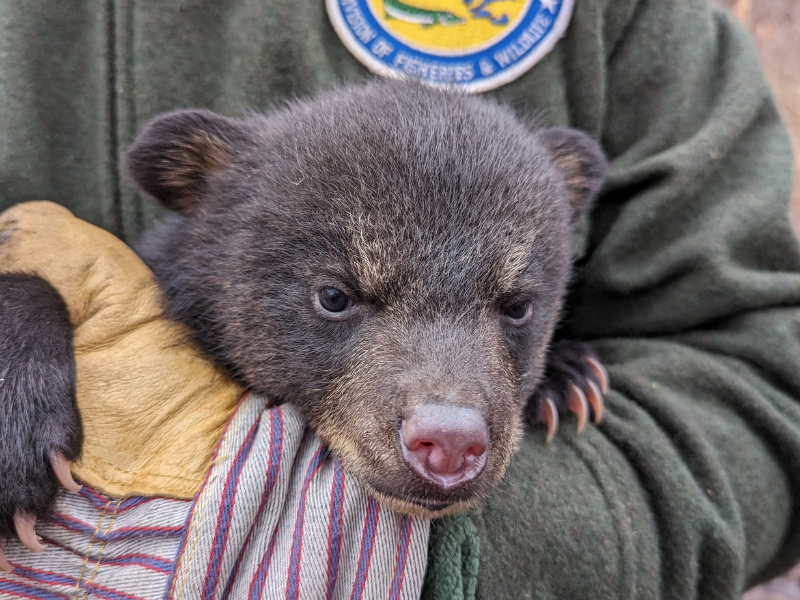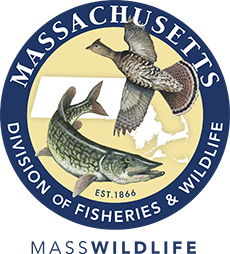- Division of Fisheries and Wildlife
Media Contact
MassWildlife

Did you know Massachusetts has one of the longest running black bear research projects in the region? For the last 40 years, MassWildlife biologists, graduate students, and researchers have been using radio tracking collars to collect essential information from female black bears, known as sows. As of today, MassWildlife has 39 sows in Massachusetts fitted with radio tracking collars. These collars provide data about sow survival, reproduction rates, and cub survival. Thanks to funding from the Massachusetts Department of Transportation (MassDOT), about half of the collars have GPS units that track bear movement and habitat use. This data helps MassWildlife and MassDOT improve habitat connectivity and minimize road impacts on bears and other wildlife. All of this information is critical to understanding our growing and expanding black bear population.
Winter Den Research
As part of this project, MassWildlife biologists visit the dens of collared sows during the winter. Sows may be in their dens alone, with newborn cubs, or with their previous winter’s cubs, called yearlings. Winter dens can be a hollow tree or log, rock crevice, or a ground nest under fallen trees or brush. Once they locate the den, biologists carefully immobilize the sow. When working with the sow, the team documents her body condition and weight. They also evaluate her collar for proper fit and function. If the female has newborn cubs, the cubs are counted, weighed, sexed, and kept warm until they’re returned to the den. If the female has yearlings, the yearlings are immobilized while biologists document the number of yearlings, their body condition, their sex, and their weight. Some female yearlings are fitted with an expandable radio tracking collar to add new bears to the study.
2024 Bear Den Season Summary
This winter, MassWildlife biologists visited 30 dens. A summary from this winter’s study includes:
- The average newborn litter size was 2.3 cubs per adult female. Three sows had 4 newborn cubs. Of the newborn cubs, there were 24 males and 13 females.
- MassWildlife confirmed cub survival for 12 sows who gave birth last winter, with 22 of 29 of their cubs surviving their first year.
- The average weight of yearlings handled was 59.5 pounds. This excludes two male yearlings that weighed 98 and 110 pounds.
- Sows were in good body condition, weighing between 140 and 298 pounds, with an average of 201 pounds.
- Many den sites included ground nests in thick vegetation and burrows under blow downs or bases of trees. One notable den was under an unused bucket truck in a construction yard.
A challenging factor during this year’s den season was the mild winter. While most black bears den for about 5 months without eating, drinking, or excreting waste, they can easily awaken, especially if temperatures are unseasonably warm. Given the string of warm days in early March, there were several signs that even sows with newborn cubs were active earlier than usual when they’re typically the last to emerge from their dens. If average temperatures continue to rise and New England seasons become less distinct, we could see non-pregnant black bears more active throughout the winter and some may forgo denning completely, which is common further south. This could cause an increase in human-bear conflict as bears would be searching for food sources year-round.
How to help black bears and prevent conflict
As bear population densities increase in central Massachusetts, and ranges expand east of I-495, it is more important than ever for people to take steps to coexist with black bears. "Please help us protect our bears and don't provide food to bears," said Dave Wattles, MassWildlife's Black Bear Project Leader. "Remove bird feeders, secure garbage, and use electric fencing to protect bees, chickens, and small livestock. When bears feed at these food sources it often ends badly for the bear."
You can help keep bears healthy and people safe by:
- Removing bird feeders: Bird feeders teach bears and other wildlife to look around our homes for an easy meal. This makes bears less cautious of people and can lead to human-wildlife conflict. If you enjoy watching birds in your yard, MassWildlife suggests adding a water feature or growing native plants, shrubs, and trees to attract birds.
- Protecting backyard bees and chickens: Standard coops and chicken wire provide inadequate protection from black bears. Properly installed and maintained electric fencing is the only way to protect chickens or bee hives from bears.
- Securing other human-associated foods: Store garbage in closed containers in a garage or outbuilding and put it by the roadside the morning of pick up. Secure compost and feed pets indoors.
Learn more at mass.gov/bears
Click here to see video footage of black bear winter den research.
